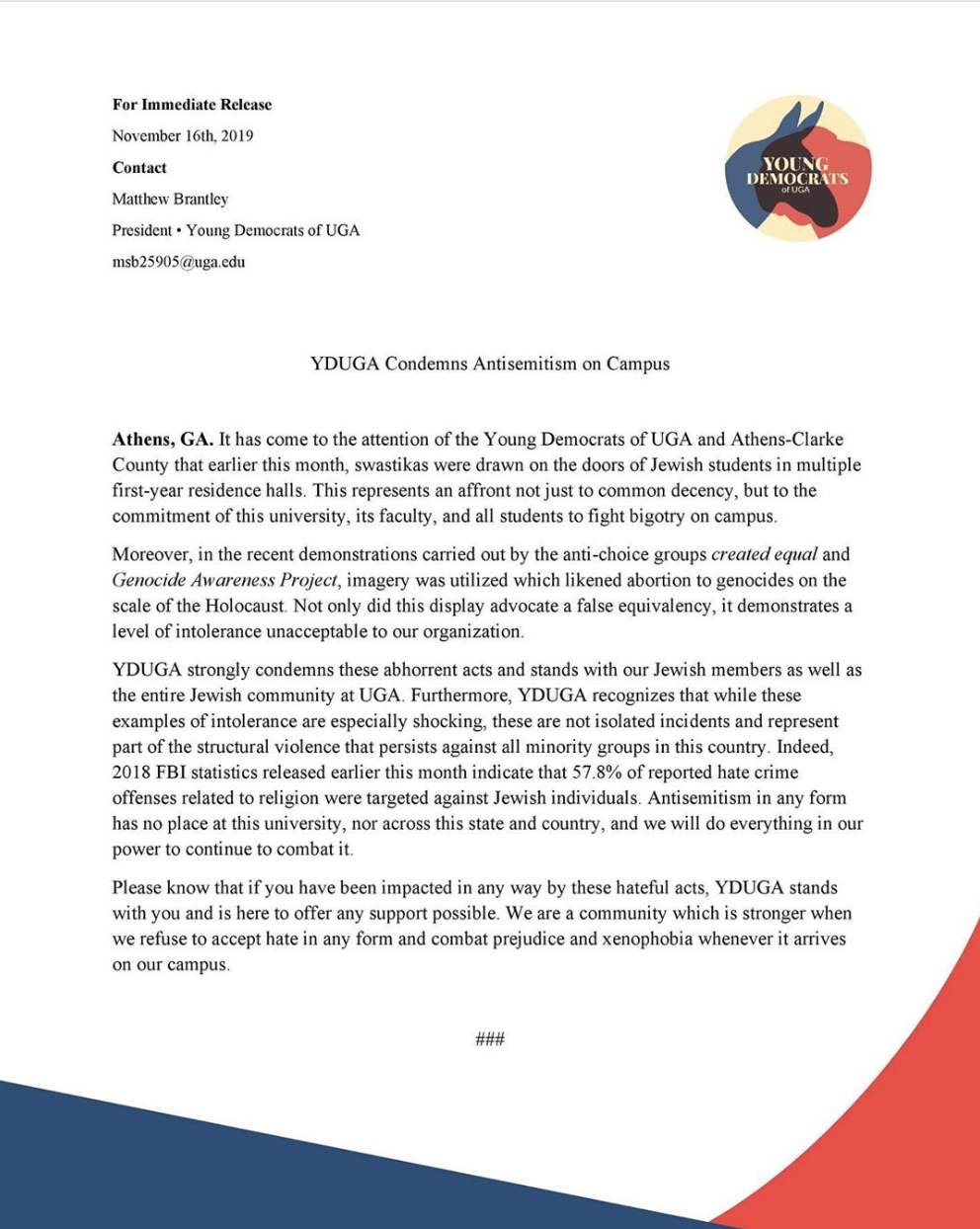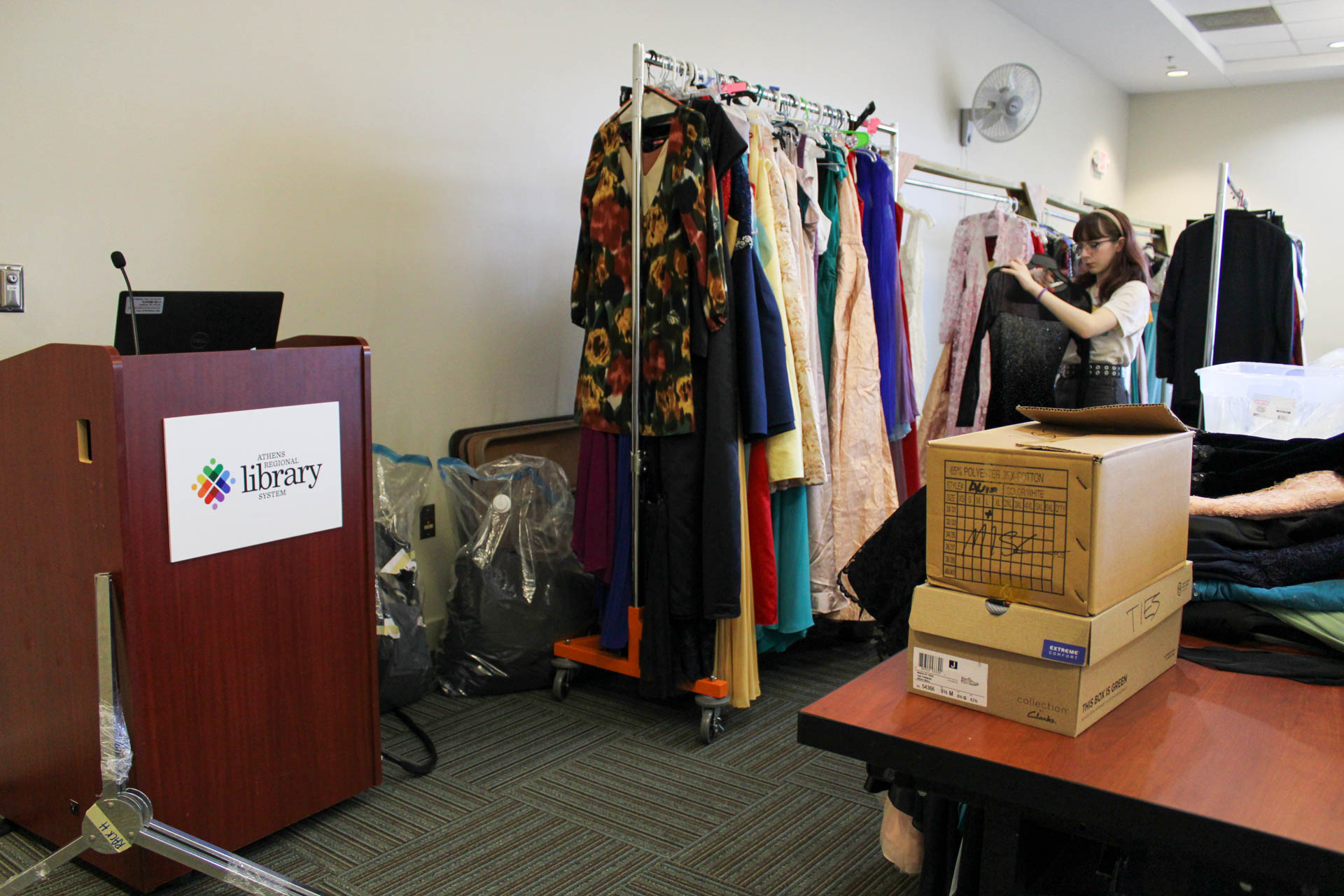A University of Georgia Jewish student is publicly speaking about acts carried out against her and others on campus. UGA has confirmed cases of “offensive symbols” on campus where swastikas were drawn on Jewish students’ doors this semester, according to an emailed statement to Grady Newsource on Nov. 19.
“We are aware of reports of offensive symbols written on the message boards on the doors of rooms in two residence halls on campus,” the statement reads. “Whenever the university receives complaints of racist or discriminatory conduct, we refer such matters to our Equal Opportunity Office in accordance with applicable laws and policies.”
Ariana Dinberg, a freshman, said the first incident happened in August.
Dinberg said the poster letters of the Sigma Delta Tau, the Jewish sorority on campus, were torn off her door. Dinberg said she reported the incident to her resident assistant.
“It already made me feel almost ashamed,” Dinberg said. “But when this happened, I hated that people knew someone Jewish lived there based on my poster and reaction from whoever did this was immediate anti-Semitism.”

She said she chose to take down the poster instead of taping it back up so another incident didn’t happen. However, it did.
In October, Dinberg said the words “All Heil” with a swastika underneath were written on the white board outside her dorm.
“I was shocked but more hurt,” Dinberg said. “I know anti-Semitism has always existed around the world, but I also think it’s become more prevalent lately.”
Dinberg said she contacted the Equal Opportunity Office, University of Georgia Police Department and University Housing about the incident.
According to the police report, there was not an apparent connection to the incident in August and October.
As of Oct. 15, Dinberg said EOO informed her that the university was still unable to identify a person or persons responsible.
Grady Newsource confirmed two reported cases where swastikas were drawn on doors of Jewish students’ doors.
Another University of Georgia student reported she returned to her dorm room in Russell Hall on Nov. 9 to find a swastika drawn on laminated name tags on her door, according to a police report filed on Nov. 18.
On Nov. 11, the student reported to the Equal Opportunity Office about the incident. EOO advised her to file an incident report with University of Georgia police.
The report states the symbol was drawn with a black dry erase marker on the student’s door. The victim stated the swastika was drawn on other doors on her hall.
“A total of 18 doors that could have potentially contained the drawings,” the report reads.
However, the report states police were unable to confirm the drawing because the symbols were erased.
Police say since the drawings were erased, there was no damage to property, and the incident did not warrant a criminal trespass investigation.
University Responds
Greg Trevor, the executive director for media communications at the University of Georgia, said in the Nov. 19 statement the affected students have met with the Equal Opportunity Office, University Housing and the University of Georgia Police Department.
When Grady Newsource reached out for clarification about the general process of investigating discrimination and harassment to the Equal Opportunity Office, Trevor provided a copy of the Non-Discrimination and Anti-Harassment Policy.
“All reports and complaints of discrimination or harassment that may fall under the jurisdiction of this Policy will be promptly evaluated and appropriate action will be taken as expeditiously as possible,” the policy reads.
The university did not comment further about how these cases are handled.
UGA Students Respond
The recent incidents of anti-Semitism on campus gained more attention after the Young Democrats of UGA posted a press release on Facebook documenting the incidents. The group stated they condemned the acts.
“We are a community which is stronger when we refuse to accept hate in any form and combat prejudice and xenophobia whenever it arrives on our campus,” the release states.

Max Harris, a Jewish student at the University of Georgia who is an active member in the Young Democrats and the Student Government Association, says he was comforted by the fact that students were alarmed about these actions on campus.
Harris said because of these repeated incidents on college campuses across the country, he was not shocked to hear it was happening at UGA.
“I was very disappointed that national events that I see happening all the time made their way to UGA because I know UGA to be a very welcoming place. … But I was also jaded by it as well,” Harris said. “If you look at this from a global perspective, this wasn’t unique.”
Cas Mudde, an international affairs professor in the UGA School of Public and International Affairs, has spent the majority of his career researching political extremism, populism and far-right movements in Europe and the United States.
Mudde said there has been anti-Semitic and racist vandalism on U.S. campuses across the country.
Just this month, George Washington University, Arizona State University and Syracuse University have responded to anti-Semitic acts on campus.
With this, Mudde said the reported incidents at UGA are “deeply disturbing, as they seem to target Jewish students by sending clearly anti-Semitic and thereby threatening messages.”
“The university should take these incidents very serious, even if they look more like ‘pranks’ by fellow students than targeted actions by far-right organizations,” Mudde said. “UGA should not tolerate any type of bigoted vandalism, whether it is meant as a prank or political intimidation,” Mudde said.
Harris said he follows the news on anti-Semitic incidents occurring worldwide. He noted that on Nov. 12, the Federal Bureau of Investigation released hate crime statistics showing that Jewish people were the most targeted group of anti-religious hate crimes.
The 2018 FBI Hate Crime Statistics report states 59.6 percent of anti-religious hate crimes were motivated by anti-Jewish bias.
Harris said it’s important to realize Jewish college students are only two generations from the victims of the Holocaust.
“Our parents have a very close relationship with the Holocaust in particular. We’re only one step away from discrimination at its worst form. So anything like this happening is very jarring,” Harris said.
The Jewish community is not stranger to anti-Semitism as a whole, but the UGA community doesn’t experience it regularly, at least not in this form,” Harris said.
Though the incidents on campus were shocking to him, Harris said he doesn’t believe the UGA Jewish community’s physical safety is at risk.
“I’m more worried about what this means for the UGA community’s attitude toward minorities overall and less about the Jewish community’s physical safety,” Harris said.
Moving forward, Harris said the Jewish community will continue to organize and apply pressure when necessary on people in leadership positions to act and protect minorities.
“When we combat discrimination, we have to do it together,” Harris said.
Ashlyn Webb is a senior journalism major in the Grady College of Journalism and Mass Communications and an international affairs major in the School of Public and International Affairs.








Show Comments (7)